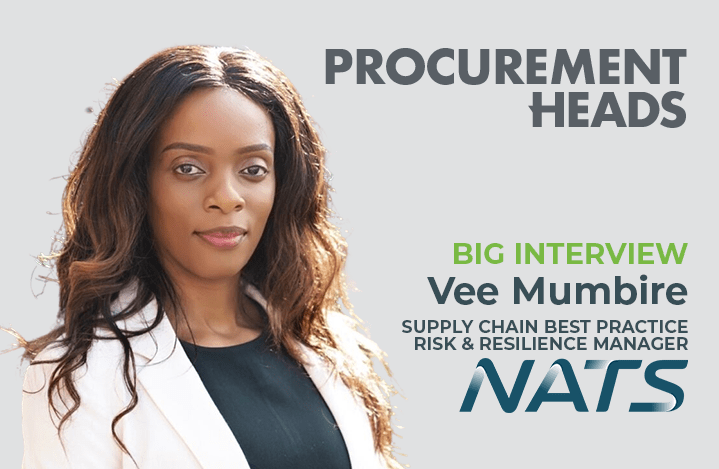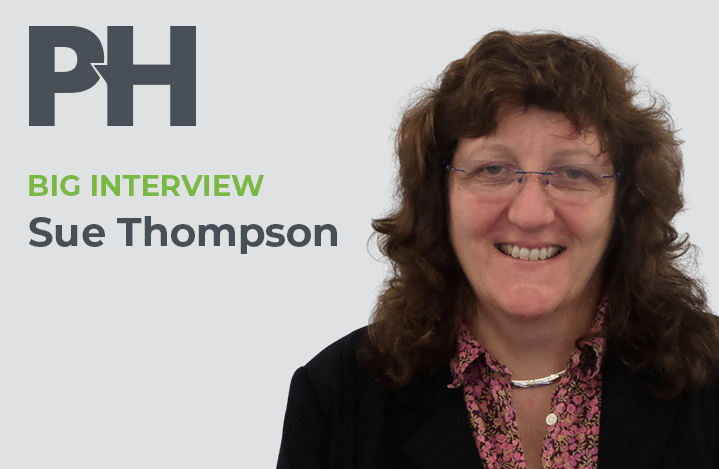For Procurement Heads‘ latest Big Interview, Vee spoke with Hayley Packham about her career and how Equality, Diversity & Inclusion contribute to achieving business goals.
How did you get into Procurement?
I got into Procurement by chance. I studied Accounting and Finance and did an internship at IBM as a Finance Analyst. Towards the end of my internship, one of my managers asked me if I would consider a graduate role in other business areas.
I was recommended for a role in Procurement and at that point did not know much about the field because it is not an area most people are aware of. It soon became apparent that most of the skills needed in Procurement are in other disciplines.
I started as a Junior Buyer and interestingly one of my first tasks was to do financial modelling. I felt that Procurement was a good fit because I could transfer my finance skills and knowledge.
Did you do your placement at IBM while you were at university?
I did my placement when I was studying for my first degree. As a placement student, the company focused more on my learning, personal and professional development, so it was a good way for me to gain industry knowledge without the pressure of being in a graduate role. I found the placement through a newspaper, which listed some of the best companies to do a placement.
I applied to a few of them and got an offer at IBM, which I accepted because of the opportunities they had.
Tell us about your biggest achievement in your Procurement career?
I think it is achieving my MCIPS last year. It was quite a challenge because I was studying while also moving jobs. I had planned to defer my Advanced Diploma but CIPS was updating the syllabus which pushed me to carry on. At one point, I did three exams in one sitting.
On another occasion, I completed two exams one morning and went into work in the afternoon as I had to sign a contract that afternoon.
My second biggest achievement was applying for and getting the role I am currently doing – risk management is a field I have always wanted to be in.
Working as a risk manager for a company that has widely recognised Procurement team, with CIPS Platinum standard – one of the few organisations who have achieved this status – gives me a great sense of achievement.
What does Equality, Diversity & Inclusion mean to you?
Diversity is recognising our differences, whether it is gender, ethnicity, age, skill gap and maybe experiences and accepting that everyone is different.
Inclusion is making sure that everybody is awarded opportunities despite those differences.
Equality works well when we consider equity, it calls for us to be aware that some may need more support than others.
An example of equity drives equality is how companies are realising that not everyone has English as their first language and the proficiency in articulation may be different, but that does not mean the person is incapable.
Therefore, they may put in place systems to allow those who are less proficient to be awarded the same opportunities as native English speakers.
What are NATS’ most important values?
Being in the aviation industry, safety is our goal.
NATS ensures that they take care of employee wellbeing and we have systems in place to achieve safety.
Every one of us has a part to play to make sure that our operational, physical, cyber and personal safety is secured every day. We work as a team and are very committed to achieving togetherness.
We collaborate, value our colleagues and demand the best of each other, which enables us to deliver for our customers and work in partnership with our stakeholders.
It was even more apparent when the pandemic began.
Finally, we put our people first and recognise that they help us solve our problems, manage our complex environment and must be taken care of if we want to achieve all of our goals.
How important is diversity to you?
Personally, diversity is important to me because there are a lot of opportunities in recognising that we all bring different knowledge and experiences.
Supply chain processes are not a one size fits all, and it is important to include different views as it encourages innovation.
Diversity also enables us to work together more efficiently and coherently and we can optimise our company and get more out of our business.
Within our circle of influence, we can recognise that bringing in new people also brings new opportunities.
Do you think that is something you consider when choosing your next company to work for?
When I worked at IBM, I was the Supplier Diversity Lead and that gave me first-hand knowledge and experience in working with diversity suppliers and what they bring to the table and this is something I will champion.
I want to be part of an organisation that not only pays lip service to diversity issues but understands its importance in our society. I think it is important, it is not just within the supply chain but in every part of the business and diversity is one area NATS sees as an important part of its DNA.
NATS has initiatives ranging from employee-led programmes for diversity groups to supply chain processes that are championing diversity and encouraging our suppliers to include diverse suppliers in their Procurement activities.
What value do you think having a diverse supply chain brings?
Diversity is part of corporate social responsibility; we work in a community and we have to contribute to the communities we work around. It is also good for bringing opportunities to diverse suppliers. By making sure that diversity is part of our agenda we are also contributing to the UK-wide economy. We are also giving ourselves opportunities to tap into new knowledge, new IT systems and allowing our suppliers to learn and develop their processes.
Does NATS have diversity programmes in place?
We have several diversity programmes in place and employee-led networks. One is for BAME colleagues, Sky Pride for LGBT+ colleagues, a young person’s network, a women’s network and the people of determination network, which is for colleagues with disabilities.
We also have a diversity and inclusion forum, which anyone can join and discuss issues that can be taken up the agenda for executive review.
How does Equality, Diversity and Inclusion contribute to achieving business goals?
I think that if you look at NATS as an organisation, where we have all these diversity programmes, we cover all the aspects of diversity, so we are bringing a lot of knowledge and diversity from different demographics.
That in itself is a strength, as we are getting multiple views.
NATS is not very telling, they are very consulting.
A lot of decisions taken are communicated, we are always kept in the loop. It creates an inclusive nature. We have seen with the global pandemic that we have had to have forums, and you see how diverse we are.
What role does Procurement play in Equality, Diversity and Inclusion considerations?
Our supplier assurance questionnaire includes questions on whether our suppliers have a diversity and inclusion programme in place. Our SME-friendly policy ensures that our Procurement processes make NATS an attractive customer to SMEs and do not create barriers which deter SMEs from competing for contracts.
We also make our contract management processes and behaviours recognise the strengths and needs of SMEs.
How does NATS celebrate its diversity?
We have several employee networks and there were plans to have a conference this year, but it was postponed until next year due to COVID restrictions. We also run face-to-face diversity and inclusion training sessions, as well as having online courses on our portal. We have champions around the business, roles which are held by people who positively help shape our culture.
What keeps you enthused about Procurement?
Working in Procurement I get to work with multiple disciplines and departments and sectors and in the current environment, where most organisations work with supply chains, we are almost at the centre of the organisation.
Because there are multiple disciplines within Procurement I can also shape my career to how I want it to be.
Procurement is a growing industry and is starting to get more attention as companies are starting to realise that supply chains are getting more complex.
Procurement plays a very big role in organisations, it is almost like the last line of defence into the company and being part of that makes me proud to be making contributions to the supply chain.






